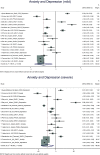Changes in anxiety and depression during the COVID-19 pandemic in the European population: A meta-analysis of changes and associations with restriction policies
- PMID: 37881862
- PMCID: PMC10755582
- DOI: 10.1192/j.eurpsy.2023.2467
Changes in anxiety and depression during the COVID-19 pandemic in the European population: A meta-analysis of changes and associations with restriction policies
Abstract
Background: Early studies of common mental disorders (CMDs) during the COVID-19 pandemic mainly report increases; however, more recent findings have been mixed. Also, studies assessing the effects of restriction measures on CMDs show varied results. The aim of this meta-analysis was to assess changes in levels of CMDs from pre-/early to during the pandemic and the effects of restriction policies in the European population.
Methods: We searched for studies assessing both pre-pandemic and peri-pandemic self-reported emotional distress and symptoms of depression or anxiety among nationally/regionally representative samples in Europe and collected microdata from those studies. Estimates of corona containment index were related to changes in CMDs using random-effects meta-regression.
Results: Our search strategy resulted in findings from 15 datasets drawn from 8 European countries being included in the meta-analysis. There was no evidence of change in the prevalence of emotional distress, anxiety, or depression from before to during the pandemic; but from early pandemic periods to later periods, there were significant decreases in emotional distress and anxiety. Increased school restrictions and social distancing were associated with small increases in self-reported emotional distress.
Conclusions: Despite initial concerns of increased emotional distress and mental illness due to the COVID-19 pandemic, the results from this meta-analysis indicate that there was a decrease in emotional distress and no change in anxiety or depression in the general population in Europe. Overall, our findings support the importance of strong governance when implementing periodic and robust restriction measures to combat the spread of COVID-19.
Keywords: COVID-19 restrictions; anxiety; depression; meta-analysis; social distancing.
Conflict of interest statement
None declared.
Figures



References
-
- Douglas PK, Douglas DB, Harrigan DC, Douglas KM. Preparing for pandemic influenza and its aftermath: Mental health issues considered. Int J Emerg Ment Health 2009;11(3):137–44. - PubMed
-
- WHO. Mental health and psychosocial considerations during the COVID-19 outbreak; 2020.
-
- Cowan K. Survey results: Understanding people’s concerns about the mental health impacts of the COVID-19 pandemic. London, UK: The Academy of Medical Sciences; 2020.
Publication types
MeSH terms
Grants and funding
LinkOut - more resources
Full Text Sources
Medical

